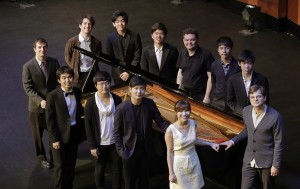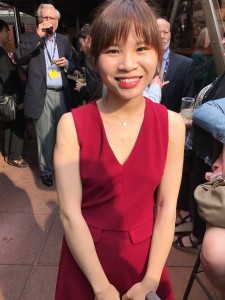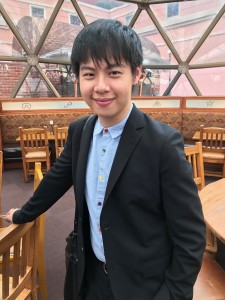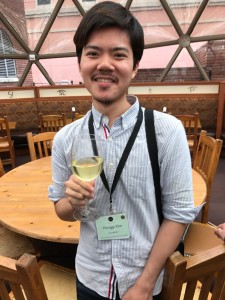
The 12 semifinalists at the Fifteenth Van Cliburn International Piano Competition held at Bass Performance Hall in Fort Worth, TX. / Photo by Ralph Lauer
The Fifteenth Van Cliburn International Piano Competition, held at Bass Performance Hall in Fort Worth, Texas, ended June 10. What a whirlwind for the competitors and the audience between May 25 and then!
Thirty pianists performed recitals in the preliminary round, 20 performed recitals in the quarterfinals, 12 performed recitals and Mozart concertos with the Fort Worth Symphony Orchestra under the direction of Nicholas McGegan in the semifinals, and six performed concertos of their own choice with the Fort Worth Symphony Orchestra under the direction of Leonard Slatkin in the finals.
The medal winners of this marathon of music were:
GOLD: Yekwon Sunwoo, South Korea, 28
SILVER: Kenneth Broberg, United States, 23
BRONZE: Daniel Hsu, United States, 19
For our wrap-up of the event, we’re including some conversations from the last couple days of the event and other tidbits. Remember, if there are any performances you’d like to see, it’s not too late. Go to the Cliburn website to stream them. We won’t get to experience the Cliburn again until 2021!
What makes the Cliburn special? Maybe it’s that Texan hospitality. Competitors told us that at other competitions, they go on stage, play the piano, go back to their hotel room and leave. At the Cliburn, they stay with a host family, have social hosts who show them the sites and take them out to eat the good Tex Mex and other fare, and attend and participate in various public and private events. “It’s great,” said semifinalist Han Chen from Taiwan. “You get exposure to a lot of people and different perspectives at the competition. You make friends and get to know pianists from around the world.”
Competition highlight: “Being here in Fort Worth. There is so much culture and so much about Van Cliburn,” said semifinalist Tony Yike Yang from Canada. “Playing in Bass Hall. Whenever I play music, I hope that I make someone’s day better or someone’s life better.” Yang, 18, won a jury discretionary award.
What do you enjoy most about playing piano? “Piano gives me the impression of an orchestra, so it gives me a lot of imagination, a lot of inspiration, and I could imagine playing the flute, the violin, the cello all at the same time,” said finalist Rachel Cheung from Hong Kong, who won the Audience Award.
Going for the gold: Grand prize winner Yekwon Sunwoo from South Korea has performed with the Juilliard Orchestra under Itzhak Perlman. He earned his bachelor’s degree at the Curtis Institute of Music and his master’s at Juilliard. He also studied with Richard Goode at the Mannes School of Music and currently studies with Bernd Goetzke in Hannover. He has earned first prize at four other competitions, most recently the 2015 International German Piano Award in Frankfurt.
The magic age of 4: That’s when many competitors started piano lessons, including Han Chen, Rachel Cheung and Rachel Kudo. Chen’s first piano lesson was on his fourth birthday. “It was a very good gift,” he said.
Youngest finalist: 19. Daniel Hsu from the United States took home the bronze medal. He also won two other awards: the Beverley Taylor Smith Award for Best Performance of a New Work and the Steven De Groote Memorial Award for the Best Performance of Chamber Music.
Zero: Number of times semifinalist Honggi Kim, 25, said he played with an orchestra before his performance of Mozart’s 23rd piano concerto with the Fort Worth Symphony Orchestra in the Cliburn International Piano Competition. By comparison, Rachel Cheung, 25, said she has been performing with orchestras since the age of 11.
New music: Han Chen, a semifinalist studying at the New England Conservatory of Music, said that supporting contemporary composers is not just the future of classical music, it’s the tradition. “I tried to bring a lot of contemporary music into this competition, pieces from 2006, 2009 and my own cadenza from 2012, 2013,” he said. “It’s important to get contemporary music out there.”
The goal: “The ultimate goal is not really winning,” said semifinalist Tony Yike Yang. “The ultimate goal is to first of all improve your art, but also to find some concert opportunities so I can share my music and I can learn from those experiences and improve myself.”
Competition highlight: “I never imagined that I would have come so far in this competition,” said finalist Rachel Cheung, who made the semifinals at the Chopin Competition. “I particularly enjoyed playing the Mozart concerto because it was the first time in the competition working with the Fort Worth Symphony and working with friends on the stage after so many solo rounds. Getting to play with the Brentano String Quartet and the Fort Worth Symphony is just a really remarkable experience. I will enjoy every moment of it.”
Tech guy: Daniel Hsu contributed to the creation of the Workflow productivity app, which won a 2015 Apple Design Award and has improved the experience of mobile devices for visually impaired users.
My way: When semifinalist Honggi Kim from South Korea gets feedback at competitions, he said he can’t change his playing for anyone. He has to play it the way he feels it.
Favorite composer? Schumann, said Han Chen, but “they’re all gods.” Also Schumann, said Honggi Kim.
Define yourself: American quarterfinalist Rachel Kudo said she’s learned that you need to define yourself as an artist and distinguish yourself, like Richard Goode is known for his performances of Beethoven, for example.
Superstar pianists are people too: Quarterfinalist Honggi Kim likes to cook Korean food while he’s studying in Germany at the Hochshule für Musik und Darstellende Kunst Frankfurt. American Kenneth Broberg, who took home the silver medal, loves hockey and baseball.
Is that…? You might have seen Rachel Kudo shopping at the Galleria in Dallas or Han Chen browsing the artwork at the Kimbell Museum.
The jury is out: Nine women competed in the preliminaries and three in the quarterfinals; only one made it to the semifinals and the finals. Is there gender bias in the major piano competitions? It depends whom you ask. If there is any unconscious bias in these competitions, based on gender or nationality, would this be remedied if the jury couldn’t see the performer, the way orchestras have blind auditions? What if Anderson and Roe, the young and hip piano duo that provided amazing coverage and commentary of the competition, were on the jury?
Pieces we wanted to hear in the final round: The competitors have to choose their entire program before the competition starts. Here is what a few of the semifinalists chose for the final round and didn’t get a chance to play:
Han Chen: Rachmaninoff Piano Concerto No. 3
Dasol Kim: Tchaikovsky Piano Concerto No. 1
Honggi Kim: Prokofiev Piano Concerto No. 2
Rachel Kudo: Brahms Piano Concerto No. 1
Yutong Sun: Prokofiev Piano Concerto No. 3
Visit www.cliburn.org.








